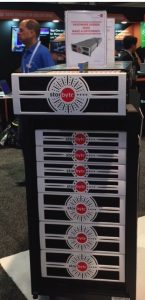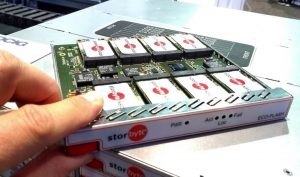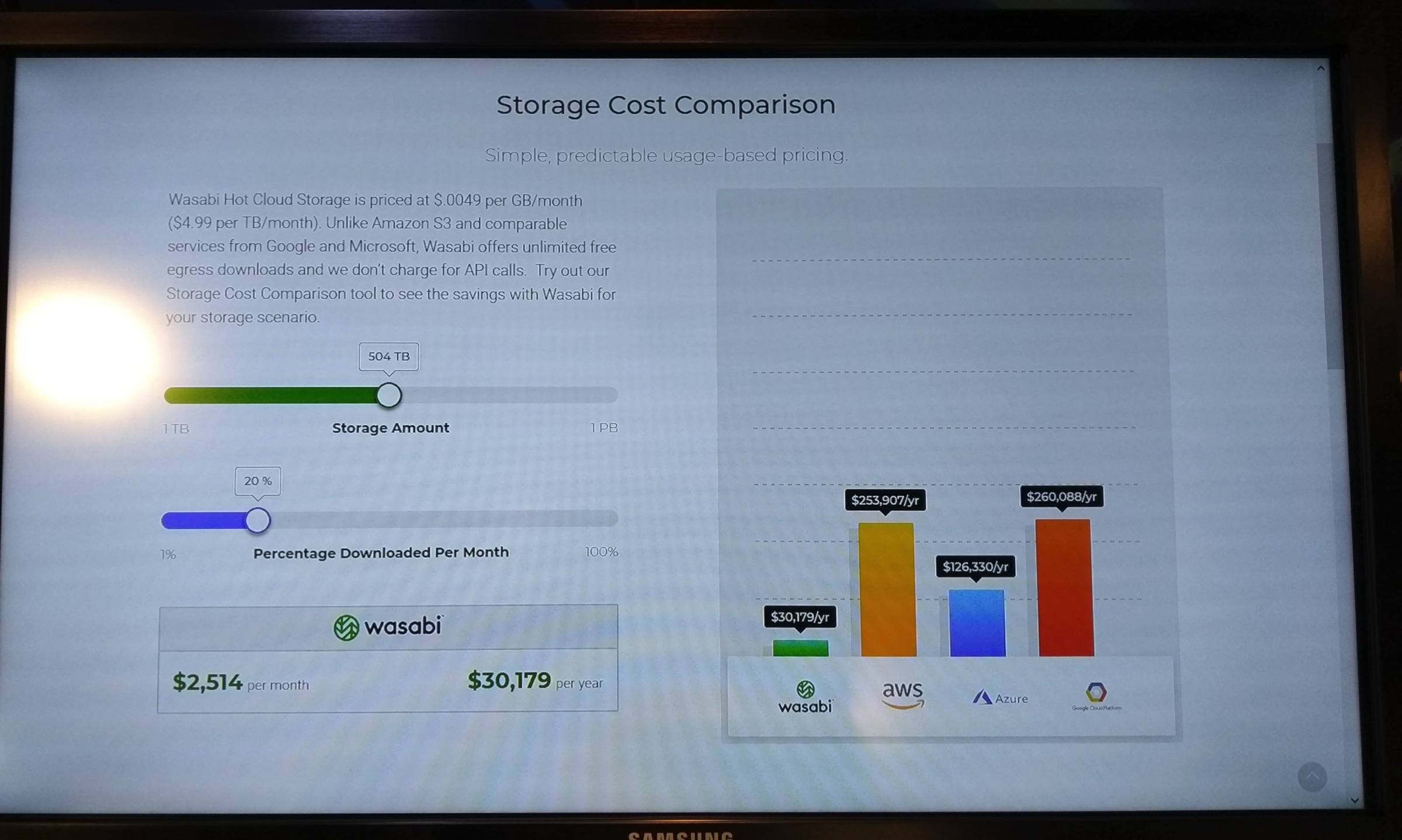Two Most Disruptive Storage Technologies at NAB 2018 – DCIG
From Storbyte and Wasabi
This is a Press Release edited by StorageNewsletter.com on April 17, 2018 at 2:29 pm The author of this article, published on April 12, 2018, is Jerome M. Wendt, founder, president and lead analyst of DCIG, Inc.
The author of this article, published on April 12, 2018, is Jerome M. Wendt, founder, president and lead analyst of DCIG, Inc.
Two Most Disruptive Storage Technologies at the NAB 2018 Show
The exhibit halls at the annual NAB show in Las Vegas, NV, always contain eye-popping displays highlighting recent technological advances as well as what is coming down the path in the world of media and entertainment. But behind NAB’s glitz and glamour lurks a hard, cold reality; every word recorded, every picture taken, and every scene filmed must be stored somewhere, usually multiple times, and available at a moment’s notice. It is these halls at the NAB show that DCIG visited where it identified two start-ups with storage technologies poised to disrupt business as usual.
Storbyte. Walking the floor at NAB, a tall, blond individual literally yanked me by the arm as I was walking by and asked me if I had ever heard of Storbyte. Truthfully, the answer was no. This person turned out to be Steve Groenke, Storbyte’s CEO, and what ensued was a great series of conversations while at NAB.
Storbytes has come to market with an all-flash array. However, it took a very different approach to solve the problems of longevity, availability and sustainable high write performance in SSDs and storage systems built with them. What makes it so disruptive is it created a product that meets the demand for extreme sustained write performance by slowing down flash and it does so at a fraction of the cost of what other all-flash arrays cost.

In looking at today’s all-flash designs, every flash vendor is actively pursuing high performance storage. The approach they take is to maximize the bandwidth to each SSD. This means their systems must use PCIe attached SSDs addressed via the new NVMe protocol.
Storbyte chose to tackle the problem differently. Its initial target customers had continuous, real-time capture and analysis requirements as they routinely burned through the most highly regarded enterprise SSDs in about seven months. Two things killed NAND flash in these environments: heat and writes.
To address this problem, Storbyte reduces heat and the number of writes that each flash module experiences by incorporating sixteen mSATA SSDs into each of its Eco*Flash SSDs. Further, Storbyte slows down the CPUs in each of the mSATA module on its system and then wide-stripes writes across all of them. According to Storbyte, this only requires about 25% of the available CPU on each mSATA module so they use less power. By also managing the writes, Storbyte simultaneously extends the life of each mSATA module on its Eco-flash drives.

The end result is a low cost, high performance, very dense, power-efficient all-flash array built using flash cards that rely upon ‘older’, ‘slower’, consumer-grade mSATA flash memory modules that can drive 1.6 million IO/s on a 4U system. More notably, its systems cost about a quarter of that of competitive ‘high performance’ all-flash arrays while packing more than a petabyte of raw flash memory capacity in 4U of rack space that use less power than almost any other all-flash array.
Wasabi Technologies, Inc. Greybeards in the storage world may recognize the Wasabi name as a provider of iSCSI SANs. Well, right name but different company. The new Wasabi recently came out of stealth mode as a low cost, high performance, cloud storage provider. By low cost, we mean 1/5 of the cost of Amazon’s slowest offering (Glacier) and at 6x the speed of Amazon’s highest performing S3 offering. In other words, you can have your low cost cloud storage and eat it too.
What makes its offering so compelling is that it offers storage capacity at $4.99/TB/month. That’s it. No additional egress charges for every time you download files. No complicated monthly statements to decipher to figure out how much you are spending and where. No costly storage architects to hire to figure out how to tier data to optimize performance and costs. This translates into one fast cloud storage tier at a much lower cost than the Big 3 (Amazon AWS, Google Cloud, and Microsoft Azure.)
Granted, Wasabi is a cloud storage provider start-up so there is an element of buyer beware. However, it is privately owned and well-funded. It is experiencing explosive growth with over 1,600 customers in just its few months of operation. It anticipates raising another round of funding. It already has data centers scattered throughout the United States and around the world with more scheduled to open.
Even so, past horror stories about cloud providers shutting their doors give every company pause by using a relatively unknown quantity to store their data. In these cases, Wasabi recommends that companies use its solution as your secondary cloud.
Its cloud offering is fully S3 compatible and most companies want a cloud alternative anyway. In this instances, store copies of your data to both Amazon and Wasabi. Once stored, run any queries, production, etc. against the Wasabi cloud. The Amazon egress charges that your company avoids by accessing its data on the Wasabi cloud will more than justify taking the risk of storing the data you routinely access on Wasabi. Then in the unlikely event Wasabi does go out of business (not that it has any plans to do so,) companies still have a copy of data with Amazon that they can fail back to.
This argument seems to resonate well with prospects. While I could not substantiate these claims, Wasabi said that they are seeing multi-petabyte deals coming their way on the NAB show floor. By using Wasabi instead of Amazon in the use case just described, these companies can save hundreds of thousands of dollars per month just by avoiding Amazon’s egress charges while mitigating their risk associated with using a start-up cloud provider such as Wasabi.
Read also:
NAB: Storbyte Exhibits Eco*Flash SSD Arrays Series
With Flex-Deploy chassis design, Hydra Dispersed Algorithmic Modeling, Data Remapping Accelerator Core, and Open Protocol for data services flexibility
2018.04.06 | Press Release
Wasabi Hot Cloud Storage Client for Mac and Windows
Free simple plug-and-play application allowing users to drag-and-drop files onto desktop, same way they would with external drive
2018.04.12 | Press Release
Wasabi Launching “Unlimited Free Egress” Pricing Plan
Eliminating all charges except basic charge for actual storage
2018.03.29 | Press Release















 Subscribe to our free daily newsletter
Subscribe to our free daily newsletter


